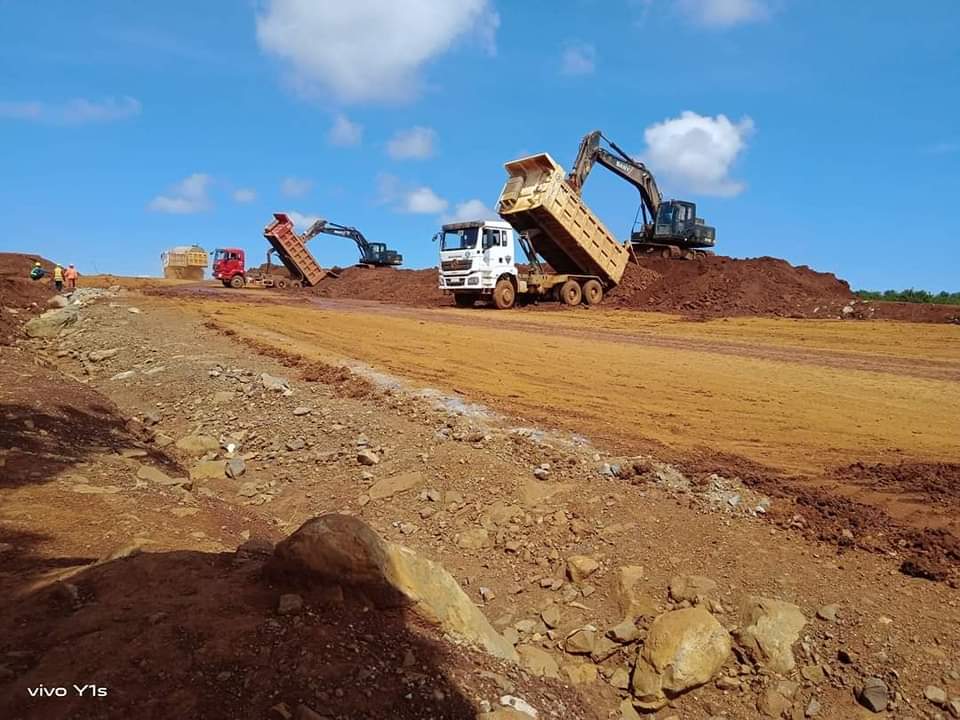By Miriam G. Desacada
Borongan City–The controversy over mining in Homonhon Island of Guiuan, Eastern Samar had assumed a clash between the purported economic development and the urgency of environmental protection, the discourse of which often ignites intense, fiery debates.
At the heart of this argument lies a fundamental question: How can we harness the earth’s resources without jeopardizing its ecological integrity?
Environmental organizations and groups of dismayed residents, with the help of the Church and its deacons, have been holding protest actions against mining, which they said only devastated the environment and watersheds, and will kill the island in the process.
The pro-mining side, however, has maintained that mining is an economic generator—providing work and livelihood to the islanders, and steady income via taxes to the local and national governments—the benefits of which far outweigh the perceived apprehensions of the environmentalists.
Both sides are generally acceptable and, thus, viable, meaning that one just cannot cancel the other but can complement each other’s instead. Which brings us back to the fundamental question: Can we harness the earth’s resources without jeopardizing its ecological integrity?
REP. NONOY LIBANAN
Amid this rather divisive debate, comes out a lawyer-legislator with a conviction to resolve it once and for all. In a recent event at his hometown in Eastern Samar, House Minority Leader Marcelino “Nonoy” Libanan of the 4Ps Party-list, gathered the regional media and expounded the solution he had in mind.
Between economic prosperity in mining and the need for environmental integrity, he said, “Mining is vital for our economy, providing jobs and resources essential for our growth. But we cannot overlook the environmental costs due to reckless mining practices.”
Libanan said he sought to redefine the narrative surrounding mining, portraying it not as a trade-off between economic development and environmental conservation but as a harmonious pursuit that promotes prosperity and sustainability.
“We need to have a balanced approach to mining,” Libanan said, while admitting the validity of the environmentalists’ complaints against an industry that may be detrimental once abused.
On balanced approach, the congressman clarified that he wanted responsible mining to be the industry’s template, in order not to disregard the people’s sentiments and the environmentalists’ concerns.
“Our duty is to ensure that our natural resources are extracted sustainably, safeguarding our environment and the well-being of our communities,” he said as he emphasized his commitment to safeguard the island from rampant abuse by the miners.
“The miners have to show their hearts for the people living near the mining sites,” he said. “They should not disturb the comfort zone of the residents. They have to assure the people that they are not there only for profit, but that they are also after the preservation of the area’s environment.”
“Mining and rehabilitation must come together. After mining, immediate rehabilitation of the site must be done, restoring the area of its terrain and vegetation, and taking care of the watersheds in the area. There must be balance between mining and environmental conservation,” he said.
Libanan said that if the mining companies, currently operating in Homonhon, have a rehabilitation plan, “I think it is not sufficient. Because why are there complainants? It means the residents there are not happy, that’s why they are protesting.”
Mining companies must earn the trust and acceptance of local communities to conduct their operations responsibly, he said, and there must be symbiotic relationship between miners and host communities.
Libanan narrated his observations when he once toured a mining company in Wyoming, USA, the largest coal producer supplying worldwide. “What they did was document first the mining area with photos of the terrain, its flora and fauna, everything, including rock formations. Then set these aside.”
He continued: “After scraping the overburden material off the coal seam or ore body, eventually extracting the mineral they wanted and loading this to a fleet of trucks for disposal to the market, the company did immediate rehabilitation. It restores the entire mined area to its original state, based on the photos they earlier had. With their expertise, you won’t even recognize that the site had underwent mining.”
RESPONSIBLE MINING
Libanan recalled that, during his time as a congressional district representative of Eastern Samar in the past, he had the mining companies closed because “they were not following the laws, had no rehabilitation plans, and were not even paying taxes.” He said: “I had them closed because they were of no use to the province.”
But closure of erring mining companies now is no longer his perceived solution to the problem of mining. His solution: a legislated responsible mining protocol that would compel miners to restore the mined area, take care of the watershed area there, and hold them accountable for any unresolved damages they caused to the environment.
Can responsible mining be done in Homonhon? Libanan was positive, and optimistic that it can be carried out. “This is my purpose in meeting with the mining companies’ officials this month (April),” he said, adding that he wants dialogue and cooperation among stakeholders to develop consensus-based solutions that balance the interests of all parties involved.
He said: “We shall lay out the mining rehabilitation plan, which must be implemented after extraction on these areas. An implementable rehabilitation plan must be in place, and I want to see whatever plans they have, in aid of legislation, to determine what laws to create to supplant whatever is lacking.”
Responsible mining allows both sides to exist on equal footing, Libanan contended. Accept mining for its economic prospects, but the environment must also be respected, said the congressman.
Of course, local government officials had been pushing for responsible mining before, but to no avail. Libanan said that, if these miners did not heed the calls of LGUs for responsible mining, congressional action then is the ultimate solution. There must be a law to compel these miners to follow responsible mining, he said.
Libanan’s championing of responsible mining is now at the forefront of his legislative agenda, determined to rectify injustices by enacting substantive changes from within the halls of Congress.
The comprehensive mining reforms he had in mind prioritize environmental sustainability, with a range of measures to mitigate pollution, protect biodiversity, rehabilitation of mined areas, and conserve watersheds, aside from holding mining companies accountable for environmental destruction.
The government must implement strict regulations and laws that dictate how mining operations should be conducted coupled with environmental protection, worker safety, and community engagement, he said.
Libanan also wanted the imposition of penalties for violation of mining regulations such as closure, permits revocation, and legal action. Conversely, incentives like tax breaks, may be offered to companies that observe responsible mining practices.
Mining permits must include conditions related to environmental impact assessments, mitigation measures, and protection of watersheds in the area. Mining activities and enforcement shall be monitored by regular inspections, audits, and investigations to ensure compliance with the laws, he said.
Sources from environmentalist groups remarked that Libanan’s leadership serves as a beacon of hope and inspiration. In his pursuit of responsible mining, he is building the infrastructure of principled governance and leadership that balances economic enterprise with environmental stewardship, they said. —Miriam G. Desacada

